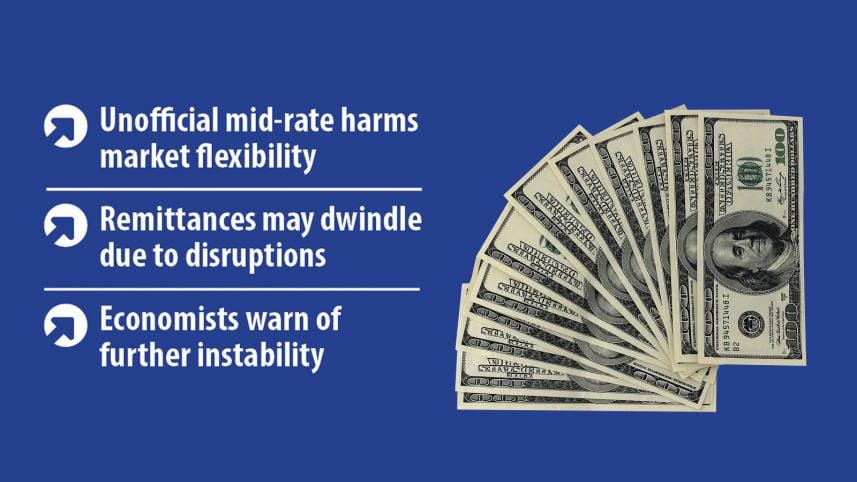Forex market in disarray

Bangladesh Bank has officially given the green light for banks to trade foreign currency at freely negotiated rates, but there's a catch. An unofficially imposed mechanism has upset the foreign exchange market, undermining the intent of liberalisation.
After a nudge from the International Monetary Fund, the central bank ditched the crawling peg exchange rate regime for a more flexible approach. It may sound promising. Not quite.
The regulator is still keeping a firm grip on things with an unofficial mid-rate, essentially a benchmark rate for transactions. That's ruffling feathers in banking circles.
The mid-rate climbed from Tk 117 to Tk 119 per dollar on the last day of 2024, stirring up plenty of debate. Bankers argue that this benchmark is more like a leash, preventing them from genuinely negotiating rates. On the other hand, central bank officials insist the system is all about keeping the market steady. But the result is confusion and complaints, and the foreign exchange market feels anything but free.
Bangladesh's forex market is teetering between reform and restriction as the central bank attempts to balance market flexibility with regulatory control. Economists and bankers warn that the central bank's tight grip on dollar rates, coupled with the growing reliance on a shadowy method, may harm remittances, a pillar of foreign exchange reserves.
Mustafa K Mujeri, executive director of the Institute for Inclusive Finance and Development and a former chief economist of Bangladesh Bank, said the universally accepted and straightforward solution to the chaos in the foreign exchange market is to avoid intervention.
"The exchange rate should be left entirely to the market, allowing demand and supply to determine the rate," he said. Mujeri emphasised that market interventions create disruptions, including the emergence of black markets and excessive demand.
HIDDEN COSTS
Yesterday, the majority of the banks officially quoted Tk 121 per dollar for inward remittances and export proceeds and Tk 122 per dollar for selling dollars to importers, according to data from the Bangladesh Foreign Exchange Dealers' Association. Some banks even quoted Tk 122 per dollar for remittances and export proceeds, and sold it at the same rate. Market insiders claim these figures exist only on paper and do not reflect the actual rates in the market.
Then there's an interbank exchange rate of Tk 122 per dollar, according to central bank data. Yet, discrepancies abound. A treasury head at a private commercial bank explained that the new exchange rate regime's requirement to maintain uniform rates for remittances and export earnings has stripped banks of profitability.
"Banks have no margin now because we cannot buy dollars for less than Tk 122 per dollar, but we are forced to sell them at the same rate," he said, requesting anonymity.
In the face of these challenges, new practices are emerging in the market. For example, banks show the prescribed rate while providing dollars to some importers, but a portion of the foreign exchange actually comes from exchange houses and aggregators. Importers are increasingly relying on this method to source dollars.
"This workaround resembles hundi [illegal channels of remittance], created by the rigid restrictions under the new exchange rate regime," said the CEO of a private bank.
Mohammed Amirul Haque, managing director of Premier Cement Mills PLC, criticised the central bank's portrayal of the market, asserting that it misrepresents the actual conditions.
"The forex market has become more corrupt over the last two years. Banks officially quote Tk 122 per dollar, but the actual rates charged to importers range between Tk 125 and Tk 128," he said, highlighting the increasing burden on businesses.
Meanwhile, many banks are shifting away from spot transactions to forward contracts to avoid losses from the volatile spot exchange rates. Spot transactions involve the immediate exchange of currencies at the prevailing rate. Sudden and unpredictable fluctuations in the exchange rate can lead to significant financial losses for banks.
By opting for forward contracts, banks agree to exchange currencies at a pre-determined rate on a future date. This shields them from unexpected swings.
IMPACT ON REMITTANCE
Bangladesh achieved a record $2.64 billion in remittances in December, spurred by a more flexible exchange rate. Yet, during the first 11 days of January, many banks received minimal or no remittances -- an indication that the strict controls on dollar rates have begun to impact remittance inflows. Islami Bank was an exception, securing over $100 million during the same period.
State-owned banks have been hit hard under the new exchange rate regime, struggling to secure remittance inflows since its introduction on December 31. To address the issue, the central bank has urged exchange houses and aggregators to prioritise state banks for selling dollars. Mohammad Shahriar Siddiqui, assistant spokesperson for BB, described this move as a "moral suasion" to ensure timely payments for essential imports and government obligations.
But private bank executives said this approach could destabilise the market further, pushing remittance flows out of formal banking channels.
Economists too fear that continued restrictions could suppress remittance flows, depriving the economy of a critical source of foreign exchange.
"The exchange rate should be freely floated, and the central bank must enhance its monitoring to ensure that no one artificially inflates the exchange rate," Mujeri said, stressing the importance of safeguarding the market against abuse.
Mujeri also explained that a freely floated exchange rate would help reduce the gap between official and unofficial rates, encouraging higher remittance inflows.
"If there are two types of rates in the market, it will harm remittances," he said, pointing out that the availability of higher rates in the hundi market diminishes the appeal of formal channels.




 For all latest news, follow The Daily Star's Google News channel.
For all latest news, follow The Daily Star's Google News channel.
Comments